In a world where health challenges can often feel overwhelming, stories of survival and resilience shine brightly as beacons of hope. Today, we have the privilege of speaking with Nicole Webb, a brave breast cancer survivor whose journey is a testament to strength, perseverance, and the power of community. From her initial diagnosis to her inspiring recovery, Nicole shares her experiences, insights, and the lessons she’s learned along the way. Join us as we delve into the remarkable story of one of our very own Virtual S.L.A.M. mamas.
When were you diagnosed and at what age?
I was diagnosed on August 2023 at 37 years old with breast cancer HER2 and Hormone+.
How was the cancer initially detected?
I went in for a mammogram and was called back in for a MRI and an ultrasound initially, followed by a biopsy. My family history had me doing early mammograms, but I skipped some due to pregnancy, breast feeding, and moving. (Hindsight, don’t skip, they can still do it!)
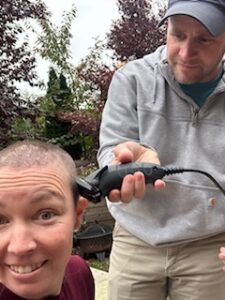
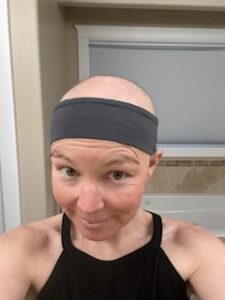
Is there a family history of breast cancer?
Yes, my mother, grandmother, and aunt.
How did you feel when you were first diagnosed?
There’s no real way to describe it. I was straight up petrified. I instantly got a therapist and some anxiety meds. The anxiety of waiting for the results of the scans and biopsies was like nothing I’d ever experienced before.
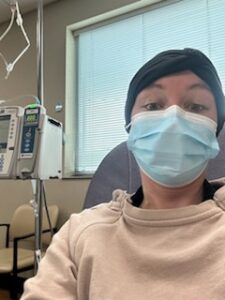
Who/what/where did you turn to after diagnosis? Who were your biggest sources of support?
My family! My husband, mom, and sister were my main go-tos, but my support system is vast! I didn’t know how large it was until I went through this.
Where are you now in your journey with Cancer?
I am 1 year post double mastectomy as of September, almost 1 year post chemo, and 6 months post radiation. I now have clear scans!
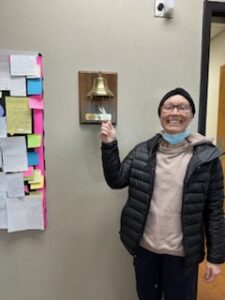
How did being diagnosed change you?
I’d probably have to ask close family and friends to really know the extent of it. I now have more anxiety in my life and talk to a therapist. Anything that is uncomfortable in my body or that feels “weird” sets me off. But, on the good side, I’m more direct and say what I want now. I’ve also learned a lot about communication and have waaaaaay more empathy and understanding for people who live with anxiety.
In my life, I feel like we are now focused on memories, having fun, just living this life the best way we can. And do it in a healthy way so we can control what’s controllable.
Did the diagnosis affect the way you look at yourself?
Yes, in both a good and bad way. I previously felt mentally strong and was comfortable in my body. After the diagnosis, I felt mentally fragile and the anxiety was like nothing I’ve ever experienced. I felt betrayed by my body and mind. Once a treatment plan was in place, I had a goal and mission. That helped.
I surrounded myself with a team and got to business. I chose not to do reconstructive surgery after the double mastectomy. I’m still deciding if I wish to. I don’t always love my body or feel pretty; my hair is still growing back and in place of boobs I have scars. I’m sick of being physically uncomfortable, which is another reason I’m undecided on reconstructive surgery. I have no desire to go through surgery again.
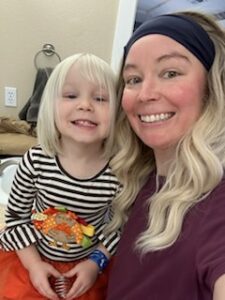
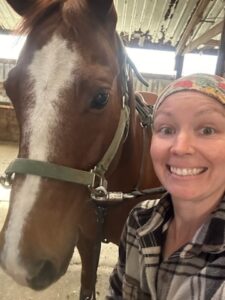
How did your body change and how did you cope with those changes?
I had a double mastectomy (there are pros and cons to this – I love not wearing a bra daily), lost my hair, lost weight, and now have shoulder mobility issues from surgery. I was really weak after. Working out still takes it out of me and I got back into horseback riding as soon as I felt comfortable on a horse. It’s my “me time” each week now. I love it, but it was hard to wait for my body to be strong enough to do the things that I know it can do.
What treatment did you undergo?
Double mastectomy, 6 rounds of chemo, 5 weeks of radiation, and maintenance treatment which includes hormone blockers for a few years (aka menopause).
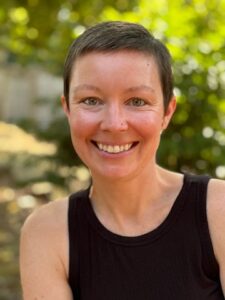
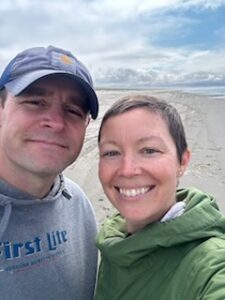
Did you choose to have breast re -construction?
No, I was too overwhelmed at the time and didn’t want to see another doctor. I’m seeing a plastic surgeon now to decide if it’s a route I want to take.
How did you choose to share your diagnosis with your loved ones?
I honestly don’t remember. There was tons of crying. My parents came out to stay while we waited for results because we live in WA and all our family is in WI. I did lots of text messages because it was hard to talk about out loud. I also just didn’t tell some people at all. It felt weird to talk about.
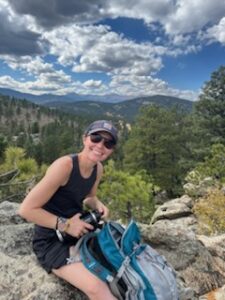
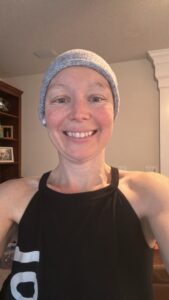
What kinds of things did you do to distract yourself when you were going through treatments?
Mostly my kids! Life goes on. They are 3yo, 5yo, and 7yo now, so our house was and is busy. My family and my husband’s family moved in with us for weeks at a time and took turns so we always had a busy house and the kids had a blast.
What challenges have you faced after completing treatment?
Anxiety. The hardest part is being scared of having to do it again (I’m working through that). I would get congratulated by people and some would try to be helpful and say “You’re done! How’s it feel? You made it” …but you’re never really done. I had more scans and more treatments and it was hard to share excitement of being “done”.
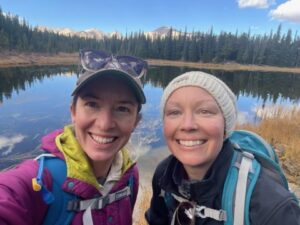
What advice would you have for newly diagnosed woman? Is there anything you wish you had known in the beginning?
You’re stronger than you think you are. Everyone wants to help, but they typically don’t know how, so tell them what you need/want. Unfortunately, people will say really dumb things and ask horrible questions.
I had an excellent team, I would advise being comfortable with your team, you’re with them a lot! I found a naturopath who specializes in oncology. That made a world of difference in how I felt. And I had an acupuncturist. I now believe everyone needs to see an acupuncturist monthly!!
Surround yourself with a support system! I have family and friends across the US who reached out. My SLAM accountabilibuddies were always there with a text and a door dash gift card! My church was amazing and I eventually found a group of ladies who went through it too and are under 45. We call ourselves the 13% because 13% of women get breast cancer and “cancer friends” just doesn’t sound that great. We have a monthly dinner date and can talk treatment, kids, side effects (we are still living with chemo side effects), and short hair styles.
What do you think people misunderstand the most about living with and/or surviving breast cancer?
You’re never really “done”. I’m done with treatment outside of some hormone stuff, but every ache, pain, or headache makes me wonder if it’s back somewhere else.
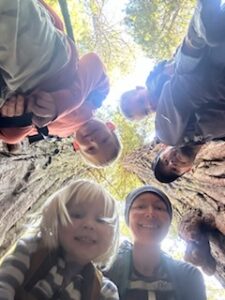
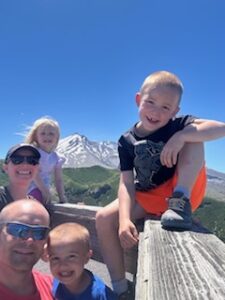
What is a typical day like for you now? Life is back to “normal”, which means carting 3 kids around, making dinner, and squeezing in workouts. I don’t care as much about the “little stuff” and I am pickier about who I spend my time with and who I call friends. I still have monthly appointments and follow ups (soooo many appointments), but otherwise I just live with a lot of hot flashes and messy hair until it grows back to something long enough to work with!
I tried to share our gratitude for those who did the journey with us because it was hard on everyone. I don’t have words for the people who prayed and stood by me locally and across the country. We had been living in WA for less than a year before being diagnosed…. It’s hard to keep/make friends when you’re going through treatment.
The last 9 months have been filled with crap, discomfort, resilience, and gratitude. To celebrate our road to returning back to “normal”, we took a roadtrip to the Redwoods to revel in the awe, majesty, and power of nature. To everyone who: prayed, sent food, flowers, packages, texts, Marco polos, wishes, blankets, cards, hugs, picked up/dropped off kids, used vacation time to move in for weeks, traveled across the country to help out and stay for months, shared your personal experiences, and all you great and new friends…. You all deserved this trip too!
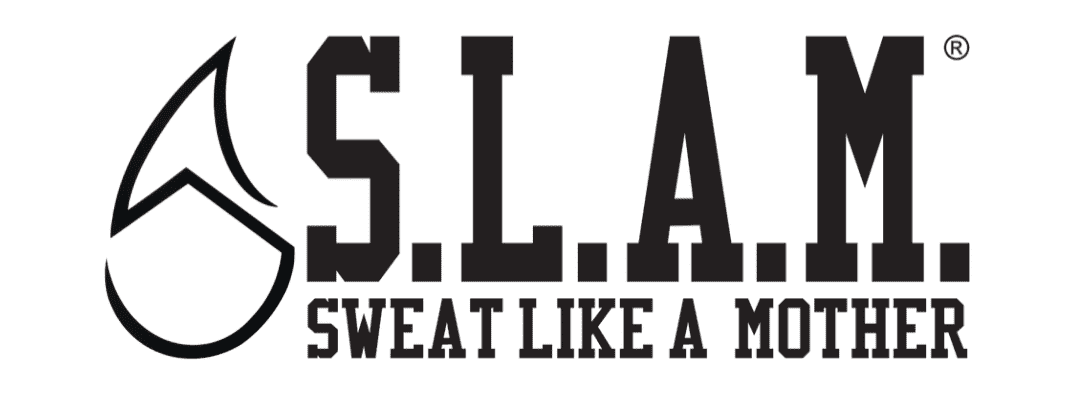
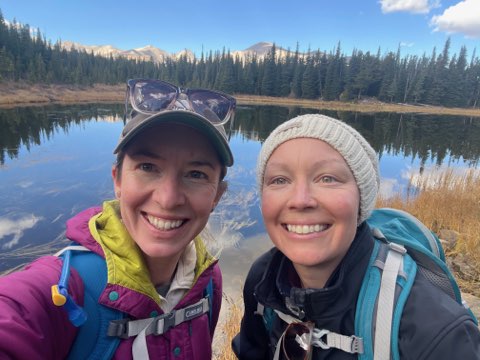
Recent Comments